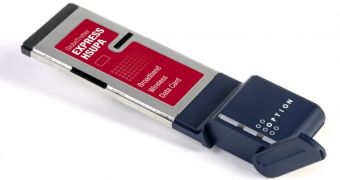Option, the Belgian developer of wireless connectivity solutions, announced that its GlobeTrotter EXPRESS HSUPA data card has been approved by the FCC and can be now commercialized in the United States. This makes Option's wireless card the first HSUPA device to get the FCC's approval.
The GlobeTrotter EXPRESS HSUPA data card is based upon Qualcomm's Mobile Station Modem, the MSM7200, which is the first chipset to enable HSUPA. The wireless card is compatible with 34 mm ExpressCard expansion slots which can be found on almost all the newest laptop models. Incorporating triple-band HSPA and UMTS, the GlobeTrotter EXPRESS HSUPA offers advanced data communication capabilities, being able to achieve HSDPA download speeds of up to 7.2 Mbps and HSUPA upload rates of up to 2 Mbps. The card maintains backward compatibility with legacy networks, being able to provide lower data rates of 3.6 Mbps and 1.8 Mbps in the downlink and up to 384 Kbps in the uplink. Also, the GlobeTrotter EXPRESS HSUPA includes support for tri-band UMTS operation at 384 Kbps as well as quad-band EDGE and GPRS to provide connectivity anywhere in the world.
The increased data rates provided by Option's data card HSUPA connection, both in the downlink and the uplink, will open the way for new mobile broadband services, improving the user-experience related to live video streaming, video-sharing services, sending and receiving email with large attachments, uploading of user-created, blogging and more.
The technical certification received by Option's GlobeTrotter EXPRESS HSUPA data card from the FCC is a mandatory requirement before the card can be used on HSUPA networks in the United States. The FCC (Federal Communications Commission) is responsible with developing technical standards for devices that emit radiofrequency energy when in use (including broadband data cards such as the GlobeTrotter EXPRESS), to ensure the efficient use of the radio spectrum in the United States. All these products must first receive an FCC certification, before they can be marketed in the U.S. The equivalent of the FCC certification in Europe is the CE certificate.

 14 DAY TRIAL //
14 DAY TRIAL //